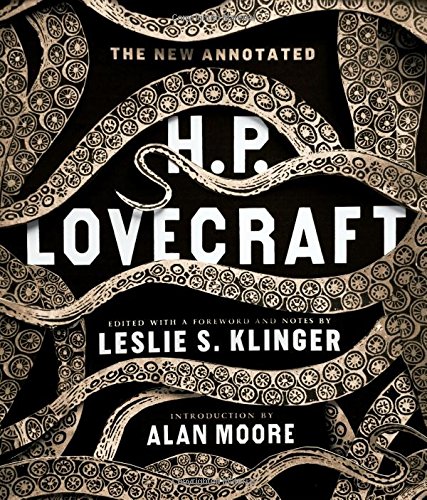 |
| front cover of the New Annotated HP Lovecraft |
Happened to catch the modern novelist, Charles Baxter's, screed on Lovecraft disguised as a "review" in the very intellectual New York Review of Books (12/4/2014).
Among other predictable complaints about Lovecraft (terrible writer with no sense of style, appeals only to adolescents, a racist, shut in, et al) Baxter tries to understand why Lovecraft is still so popular and comes up with the partronizing notion that Lovecraft only appeals to like-minded people (morbid, paranoid, suspicious).
Oh, brother...
Here are few "gems" from this so-called review (little mention of Les Klinger's annotations; no mention of Alan Moore's introduction).
"His narrators cannot calm down; the fever never breaks. Accordingly, simple human decency, kindness, and generosity have no place anywhere in the stories. Their emotional range is limited to dread on one end of the spectrum and hysteria on the other".
"In my judgment, Lovecraft’s true staying power as a writer can be attributed to his chilling depictions of death-in-life, the one subject in which he could claim genuine expertise".
"After both world wars and the atrocities of recent history, Lovecraft’s horrors seem like quaint, construction-paper toys created by someone who did not get outside much—he never went to Europe—and who built his puppet theaters out of whatever was lying around."
Thankfully, we have S.T. Joshi's brilliant reply to Charles Baxter's review. Joshi is a Lovecraft authority and has written extensively on the "Weird Tale" tradition that Lovecraft drew on as a writer. He's also written the definitive biography of Lovecraft (I Am Providence).
 |
| front page of STJoshi.org |
Here are some lovely quotes from this well-written riposte to Baxter's awful review. I chose comments that focused on racism, the adolescent claim and his (Lovecraft's) connection to the Weird Tale tradition in American Literature:
"Charles Baxter appears determined to pigeonhole Lovecraft as a writer of interest only to “adolescents.” While it is true that a substantial number of Lovecraft devotees initially read him as adolescents, a fair number of these fans grow up to be reasonably mature writers in their own right who continue to draw upon Lovecraft’s writings for aesthetic inspiration"
"Baxter goes on to assume—based on a stray comment made early in his career (“Adulthood is hell”)—that Lovecraft himself remained an arrested adolescent. In fact, he was largely successful in overcoming the severe psychological damage resulting from his early upbringing (he was raised by two parents who were borderline psychotics) and became a surprisingly well-adjusted and outgoing individual, and one who exhibited a keen interest in the world around him."
"There is also the question of exactly how much racism enters into Lovecraft’s fiction. Baxter maintains that it is central. Another reviewer of the Klinger book—John Gray, writing in the New Republic—offers a different opinion: “Fortunately, the core of his work has nothing to do with his social and racial resentments.”[7] I am inclined to agree with Gray. Such things as atheism,[1] devotion to science, and love of the past are all far more central to both his philosophy and to his fiction than racism."
"The upshot of all this is that Lovecraft developed, in the course of a relatively short career spanning less than twenty years, a highly coherent aesthetic of the weird and developed a prose style that he believed was appropriate to its expression. Whatever one may think of Lovecraft’s prose, I would suggest to Mr. Baxter that he be a little less intolerant when assessing work that doesn’t accord with his own presuppositions."















0 comments → Oh, How They Love to Hate the Craft of Lovecraft
Post a Comment